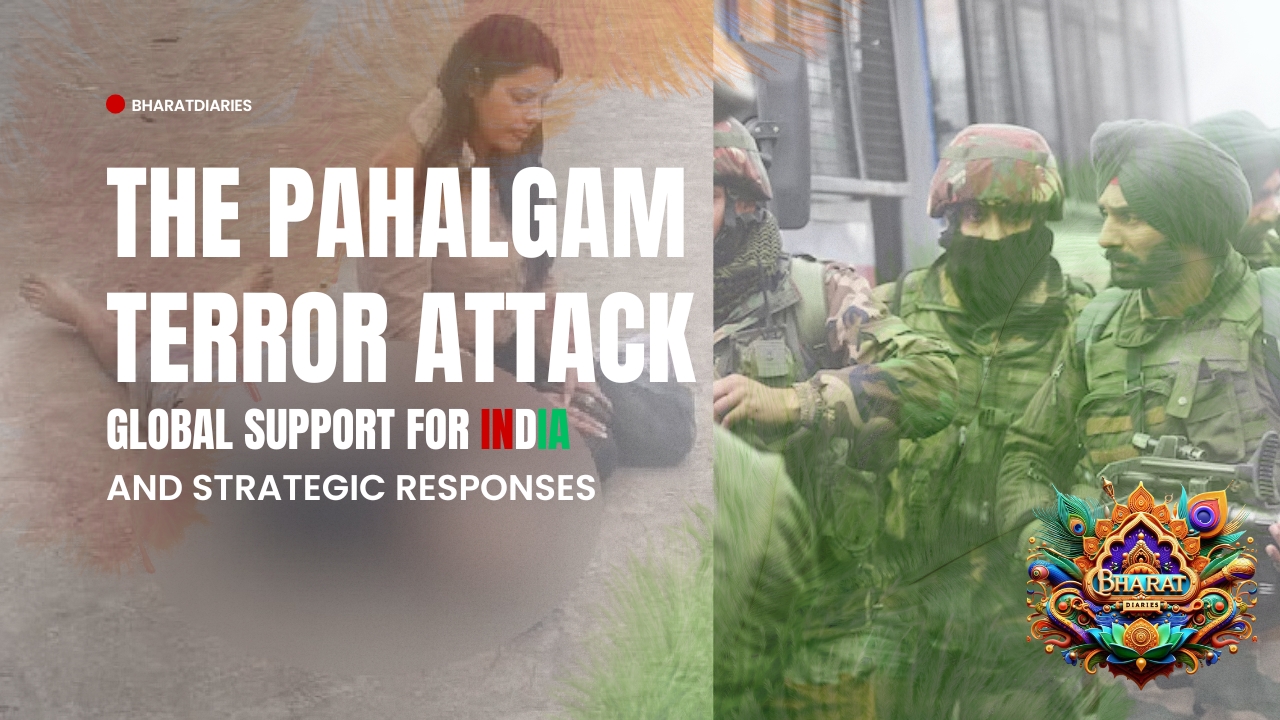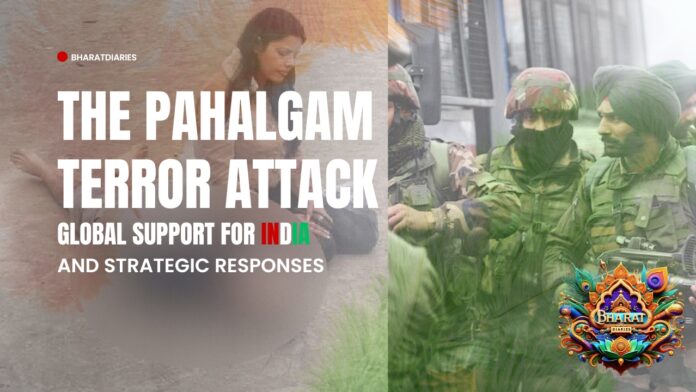
India mourns after the 2025 Pahalgam terror attack that killed 26. Read the full story, global support, and India’s strong five-point response including Indus Waters Treaty suspension.
Table of Contents
On 22 April 2025, the serenity of Jammu and Kashmir’s picturesque Baisaran Valley was shattered by a brutal terrorist attack that left 26 dead and over 20 injured. In what has been described as the deadliest such incident since the 2008 Mumbai attacks, five heavily armed militants targeted male non-Muslim tourists in a premeditated massacre. This tragic event shocked the entire nation and sparked outrage worldwide.
The incident was more than just an act of violence—it exposed the vulnerability of civilians in conflict zones, the ruthless ideology of cross-border terrorism, and the ongoing challenge India faces in Jammu and Kashmir. In response, the Indian government launched a comprehensive counter-strategy, including diplomatic and military actions. This blog explores the full timeline of the attack, the international response, and the decisive five-point plan announced by the Indian Ministry of External Affairs.
Watch the full video in hindi
https://bharatdiaries.com/bhagavad-gita-added-to-unescos-memory-of-world/
The Pahalgam Terror Attack: A Timeline of Horror
A Peaceful Day Turns Deadly
On 22 April 2025, five militants infiltrated the Baisaran Valley, a scenic alpine meadow located just 7 km from Pahalgam in Anantnag district. The area, a popular destination for tourists, is accessible only on foot or horseback and surrounded by dense pine forests, making it difficult for quick reinforcements to arrive. Unfortunately, it was lightly guarded due to its remote location.
The attackers, dressed in military-style uniforms and armed with AK-47s and M4 carbines, opened fire indiscriminately on tourists after identifying their religion. Reports confirmed the assailants forced the victims to recite Islamic verses to segregate them. Those who could not recite the Kalima, like Christian tourist Sushil Nathaniel from Madhya Pradesh, were shot. Some men were forced to undress to check for circumcision—a gruesome method to determine religious identity.
One particularly haunting detail emerged from eyewitness accounts: a female tourist was spared by a militant, who chillingly instructed her to “narrate the horrors” to Indian Prime Minister Narendra Modi.
Heroic Acts Amid Tragedy
Local pony operator Syed Adil Hussain Shah attempted to wrestle a weapon from an attacker in a desperate bid to save tourists. He was shot and killed, emerging as a symbol of local courage. Despite the chaos, some locals helped rescue injured tourists, transporting them on ponies and makeshift stretchers until emergency services arrived.
Casualties and Losses in Pahalgam Terror Attack
The toll was devastating: 26 civilians killed, including 23 Indian nationals, one local from Jammu and Kashmir, and two foreign tourists—from Nepal and the UAE. Over 20 others sustained injuries. Among the dead were three government officials: newlywed officers from the Indian Air Force and Indian Navy, and one Intelligence Bureau operative. Victims hailed from across India—Uttar Pradesh, Maharashtra, Kerala, Odisha, Karnataka, and more—representing the nation’s collective grief.
Global Reaction: The World Stands With India
The heinous nature of the Pahalgam terror attack evoked an immediate and widespread global reaction. Major world powers, international organizations, and diaspora communities expressed solidarity with India.
United States
The U.S. State Department condemned the attack in the strongest terms, reaffirming America’s commitment to counterterrorism cooperation with India. President Joe Biden personally extended condolences, stating, “India’s pain is our pain. We stand shoulder to shoulder in the fight against extremism.”
United Kingdom and European Union
UK Prime Minister Rishi Sunak called the attack “a brutal assault on humanity” and pledged intelligence-sharing support. The European Union issued a unified statement condemning the attack and called on Pakistan to “dismantle terror infrastructure” operating from its soil.
France and Australia
French President Emmanuel Macron denounced the attack as a “barbaric act against innocents,” and Australia’s PM Anthony Albanese offered to assist in intelligence operations and counter-terrorism training.
Middle East and South Asia
The UAE, mourning the loss of one of its nationals, demanded international accountability for terrorist groups operating under political protection. Bangladesh, Bhutan, and Sri Lanka conveyed strong support and emphasized regional unity against terror.
Global Institutions
The United Nations condemned the attack unequivocally. Secretary-General António Guterres expressed “deep sadness,” while urging all nations to cooperate in uprooting extremist ideologies that incite such targeted violence.
India’s Swift and Strategic Response
High-Level Emergency Meetings
Prime Minister Narendra Modi immediately cut short his Saudi Arabia visit and convened a high-priority meeting of the Cabinet Committee on Security (CCS). The urgency and severity of the situation demanded a bold and comprehensive response.
Home Minister’s Visit and Security Review
Union Home Minister Amit Shah flew to Srinagar the very next day, 23 April, to personally oversee the security operations. He visited the attack site and met with victims’ families and local responders, reinforcing the government’s commitment to justice.
Military and Investigative Action
The Indian Army, in coordination with Jammu and Kashmir Police and paramilitary forces, launched a full-scale cordon-and-search operation. A lockdown was briefly imposed in Pahalgam, and aerial reconnaissance was deployed to track fleeing terrorists who were believed to have escaped into the Pir Panjal mountain range.
On 23 April, the National Investigation Agency (NIA) arrived at the scene and began gathering evidence. By 24 April, sketches of three suspected militants—linked to Lashkar-e-Taiba and identified as Asif Fauji, Suleman Shah, and Abu Talha—were released. Two were confirmed foreign nationals.
Five-Point Response by the Indian Government
In a significant diplomatic offensive, Foreign Secretary Vikram Misri outlined India’s official response on 24 April. Addressing senior diplomats and media, he unveiled five key decisions aimed at pressuring Pakistan and reinforcing national security:
1. Suspension of the Indus Waters Treaty
India announced the immediate suspension of the Indus Waters Treaty, a water-sharing agreement with Pakistan dating back to 1960. This was the most aggressive diplomatic step, reflecting the government’s intent to use strategic leverage until Pakistan halts support to cross-border terror outfits.
2. Closure of Main Border Crossing
India closed the principal border crossing between the two countries, halting trade and passenger movement. This step was aimed at cutting off any logistical aid potentially flowing across the border.
3. SAARC Visa Exemption Suspended for Pakistanis
The government suspended the SAARC Visa Exemption Scheme for Pakistani nationals, effectively halting all travel from Pakistan under the regional framework. This prevented unchecked entry and tightened cross-border movement.
4. Cancellation of All Pakistani Visas
All previously issued Indian visas to Pakistani citizens were canceled with immediate effect. New visa applications from Pakistan were suspended until further notice.
5. Diplomatic Expulsions
India expelled Pakistani military advisers from the Pakistani High Commission in New Delhi, and simultaneously withdrew its own staff from Islamabad, signaling a sharp diplomatic downgrade in bilateral ties.
Community and Civilian Response
Despite the trauma, local communities in Kashmir showed incredible courage and compassion. Gurudwaras opened their doors for shelter, and pony handlers risked their lives to carry the wounded to safety. Citizens across India stood united in grief, holding candlelight vigils and sharing messages of solidarity on social media.
Political and National Unity
On 24 April, the central government held an all-party meeting to ensure transparency and political consensus. Opposition leaders supported the government’s measures and expressed the need for a non-partisan approach to national security.
This rare moment of unity reinforced the nation’s resolve and sent a strong message both to terror groups and their state sponsors: India will not be intimidated.
Conclusion
The 2025 Pahalgam terror attack stands as a horrifying reminder of the deep-rooted challenges India continues to face in its fight against cross-border terrorism. But it also showcased the nation’s resilience, the bravery of ordinary citizens, and the clarity of India’s leadership in responding with strength and dignity.
From the suspension of the Indus Waters Treaty to coordinated global diplomacy, India’s five-point plan is not just a reaction—it’s a message to the world: terror will not break us.
Let this be a moment of reflection, but also one of resolve. The lives lost at Pahalgam Terror Attack must never be forgotten, and their memory must inspire a safer, stronger India for generations to come.
